Summary of the Common Future Congress on Cooperation with Ukraine
On 22–23 September 2025, the Poznań Congress Centre, located on the grounds of the Poznań International Fair, hosted the third edition of the Common Future Congress on Cooperation with Ukraine. This year's edition of the event attracted a record number of participants, who had the opportunity to listen to almost 30 debates organised on four stages. The topics covered included the TSL industry, construction, energy, and the professional activation of war veterans.
The official inauguration of the congress was preceded by a press conference attended by representatives of the organiser, content partners, the Polish Government and the Ukrainian Embassy in Poland. Filip Bittner, Konrad Gołota, Paweł Kowal, Jacek Piechota, Andrzej Porawski, Marcin Wojdat and Roman Shepelyak discussed, among other things, the importance of Polish-Ukrainian cooperation, the role of the defence industry during hybrid warfare, as well as the intergovernmental agreement between Poland and Ukraine and its prospects.

Grand opening of the Common Future Congress on Cooperation with Ukraine
During the inauguration of the third edition of the Common Future Congress of Cooperation with Ukraine, Filip Bittner, Vice-President of the Grupa MTP, drew attention to the practical effects of previous editions and the need to continue developing tools for cooperation: "In Poznań, we talk about problems, challenges and, above all, how to solve them. The agreements signed during the previous edition are in force, funds for entrepreneurs are being released, and new opportunities and tools are being systematically developed."
In a special address from Kyiv, Taras Kachka, Deputy Prime Minister of Ukraine for European and NATO Integration, highlighted the importance of long-term cooperation between Poland and Ukraine, emphasising both the economic aspects and strategic support for the country's reconstruction: "I believe that together we will build a common future – this is a great challenge for Poland, Ukraine and all the companies involved. It is a task for entire generations, for decades to come – it is extremely important that it be supported by economic and institutional support. Poland is the number one partner for Ukrainian trade, but attention also needs to be paid to infrastructure, business and development as such."
Paweł Kowal, Chairman of the Council for Cooperation with Ukraine at the Chancellery of the Prime Minister, pointed to the strategic dimension of the event and the role of Polish business in the reconstruction of Ukraine: "These are the most important talks of the year in the context of Ukraine. Polish business must participate in the process of rebuilding the country, and investments will be the main task for this year. It is also an opportunity for joint planning and facing challenges, including disinformation."

Security, integration and reconstruction – conclusions from the plenipotentiary debate
During the debate between government plenipotentiaries on the reconstruction of Ukraine, the strategic importance of regional security and international cooperation was emphasised. Paweł Kowal, Chairman of the Council for Cooperation with Ukraine, noted that "There can be no reconstruction without putting a stop to Russian attacks. The reconstruction process is in fact three processes: integration, modernisation and reconstruction in a new style."
Juris Poikāns, Latvian Ambassador to Ukraine, spoke in a similar vein, emphasising the importance of regional cooperation: "I express my full support for cooperation between Poland and Ukraine. We want to be part of the whole cooperation – schools, hospitals, border areas – within our capabilities."
Darius Skusevičius, Lithuania's ambassador for the coordination of Ukraine's reconstruction, added: "A regional approach to Ukraine's reconstruction is strategic. Support for reforms and government programmes, as well as cooperation with business, will enable the physical reconstruction of the country."
The debate showed that the effective reconstruction of Ukraine requires not only financial and institutional support, but also the active participation of the countries of the region and the private sector in the implementation of specific projects, including in the areas of education, healthcare and infrastructure.
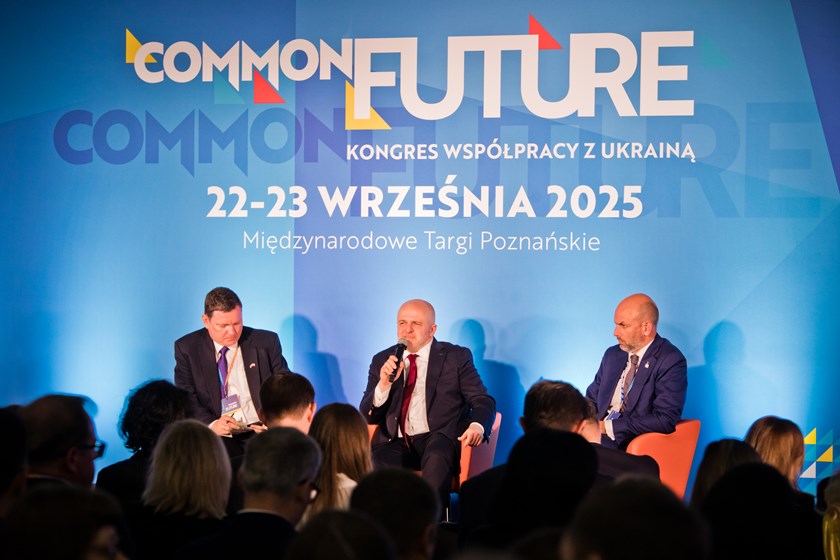
The reality of doing business in a country engulfed by war
The next highlight of the agenda was a plenary debate entitled ‘Doing business during full-scale war. Experiences of Polish investors and managers,’ attended by representatives of companies actively investing in Ukraine.
As Paweł Dziekoński, Vice-President of FAKRO Sp. z o.o., pointed out "The plant was severely damaged two years ago. In addition to products, we lost a lot of humanitarian aid funds. Nevertheless, despite these losses, operations were maintained, even without support from the state, from which we unfortunately did not receive any assistance (...) Since the war, the company has not been making a profit in the Ukrainian region; currently, we are "contributing" to the so-called business every year. (...) I would like to warn everyone who wants to invest in Ukraine – it is difficult, you need to be patient and determined, but we are the best example that it is possible." The representative of FAKRO also pointed to one of the most serious problems related to operating on the Ukrainian market – "Raw materials – an absolutely unpredictable market. Wood has doubled in price, which in my opinion is pure speculation (...) Speculation is a huge risk factor. In addition, there is the issue of border capacity – here I strongly urge that supply chains be secured."
Marcin Witczak, President of Laude Smart Intermodal S.A., pointed to the need for legal simplification and institutional cooperation: "At the moment, nothing is really happening with the money that is currently flowing. The Polish government should create an instrument to facilitate the operation of companies on the Ukrainian market. We should insist that Ukraine join the EU in legal terms today. If we harmonise regulations, more companies will decide to cooperate with the region. European law must be imposed because it is in our and Ukraine's interest."
It was clear from the speakers' statements that doing business in Ukraine requires both resilience and flexibility on the part of companies, as well as institutional support to effectively maintain operations and support the country's reconstruction.

Joint declaration of actions for Polish-Ukrainian cooperation
On the first day of the congress, 22 September, two memorandums of understanding on cooperation were signed. The first one was between Międzynarodowe Targi Poznańskie Sp. z o.o. and the Ministry of Foreign Affairs of Ukraine. The document was signed on behalf of the institutions by Filip Bittner, Vice-President of the Grupa MTP, and Roman Shepelyak, Minister-Counsellor of the Embassy of Ukraine in the Republic of Poland, respectively. The second memorandum was concluded between the Polish-Ukrainian Chamber of Commerce, represented by PUIG President Jacek Piechota, and the Union of Ukrainian Entrepreneurs (SUP), represented by Kateryna Glazkova, Chairwoman of the Union.
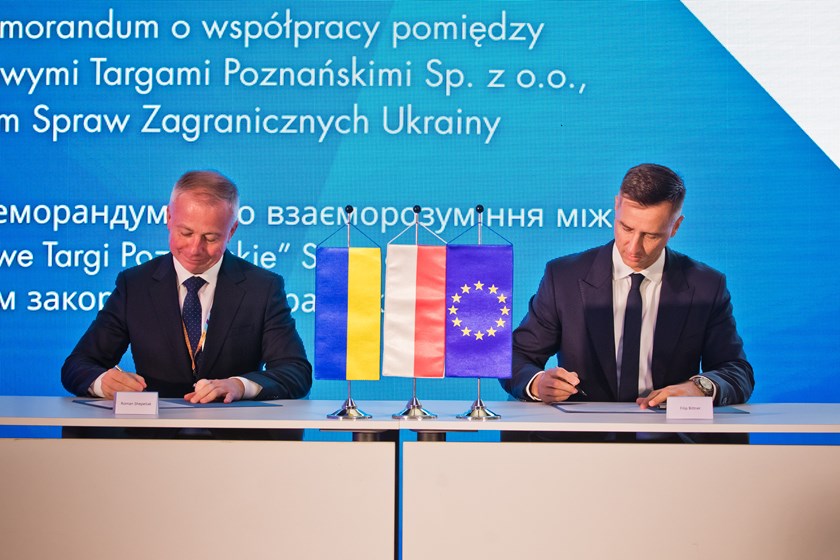
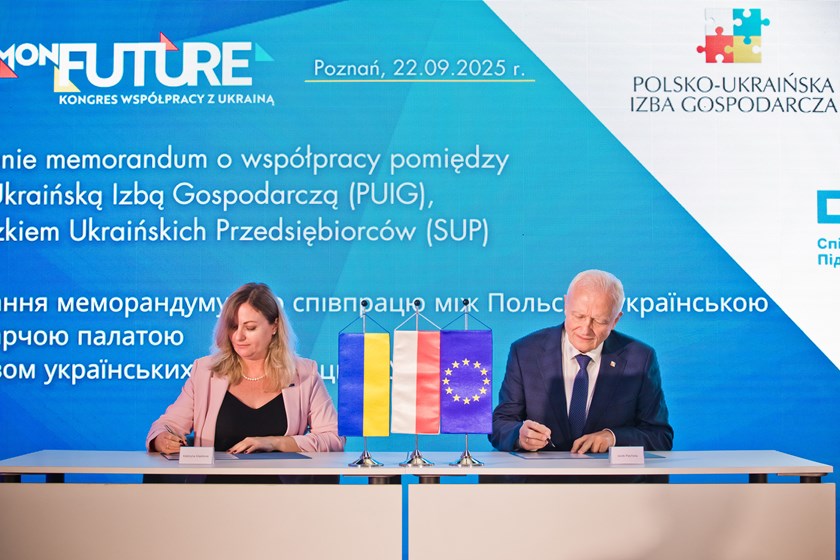
Ukraine on the path to recovery – financing and investment strategies
During the debate entitled "Financing the reconstruction and modernisation of Ukraine – business or politics?", experts, representatives of the Ukrainian government and Polish financial institutions discussed the challenges associated with rebuilding and modernising the country in wartime.
Oleksiy Ryabikin, Deputy Minister of Community and Territorial Development of Ukraine, emphasised the extraordinary resilience of local communities: "After night-time missile and drone attacks, towns and villages continue to function, and people are rebuilding their lives (...) We must rebuild the infrastructure so that people can live normally and do not have to look for other places to live."
When asked about the second pillar of the Ukraine Facility instrument, Marta Postuła, First Deputy President of Bank Gospodarstwa Krajowego, replied: "We already have a mandate from the European Commission and a financial instrument plan in place. We are waiting for the Polish-Ukrainian intergovernmental agreement and the signing of the agreement with the European Commission. If everything goes according to plan, we want to start operations in the fourth quarter of this year. In the meantime, we have already launched loans worth PLN 250 million for Polish exporters to strengthen their position on the Ukrainian market."
Mariusz Jaszczyk from the Polish Development Fund pointed to the important role of development institutions in supporting Polish companies entering the Ukrainian market: "Our role as PFR is not to compete with the commercial market, but to open up transactions that the market itself would not decide on. Polish companies, even those with their own capital, come to us because cooperation with a development institution gives them a sense of security and a kind of “guarantor's stamp.”
Paneliści zgodzili się, że odbudowa Ukrainy wymaga nie tylko środków finansowych, ale też koordynacji państwa, wsparcia międzynarodowego oraz aktywnego udziału sektora prywatnego. Tworzenie długoterminowej architektury finansowej, łączącej kapitał publiczny i prywatny, pozwala skutecznie realizować projekty w Ukrainie, a całkowity koszt odbudowy szacowany jest na ponad 500 miliardów dolarów – mniej więcej trzykrotność wartości Planu Marshalla.
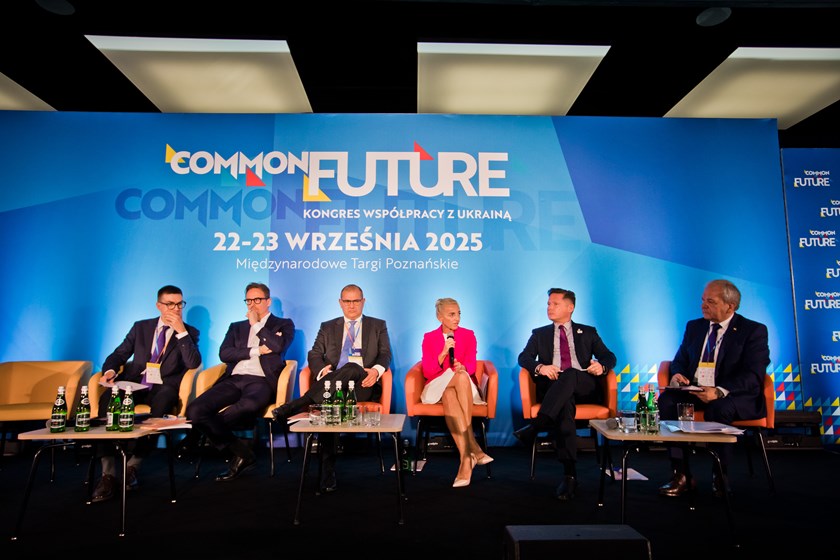
Secure Ukraine: energy challenges and investments in the future
During the panel discussion entitled “Ukraine’s energy resilience. Reserves, distribution of generation capacity and flexible balancing, green and distributed energy, international cooperation”, participants discussed key challenges for the Ukrainian energy sector during the war and the role of Polish and international companies in rebuilding the country.
Dawid Siudek, Deputy Director of ORLEN's Representative Office in Kyiv, emphasised the importance of the company he represents: "Building economic value and security is crucial. We supply fuels that power cars and machinery, as well as lubricants. Roads are rebuilt with our asphalt, houses are supplied with gas provided by Orlen, and shops use packaging made from our polymers."
Marcin Białek, President of the Management Board of Biogas System S.A., pointed to the role of innovation and green energy in reconstruction: “Biogas is the only Polish company included in the EU strategy. Our technology allows for daily substrate changes, and it is possible to produce heat, energy and dry ice in a closed cycle. Gas converted into biomethane – this will definitely happen. After 2040, the EU will ban the use of gas, which is why companies are taking steps to label their products as green."
All the presentations showed that Ukraine's energy resilience during the war is a combination of rapid response, innovative technologies and international cooperation – from fuel supplies and infrastructure repairs to the development of green energy and flexible power balancing, which are already shaping the future of the Ukrainian economy today.
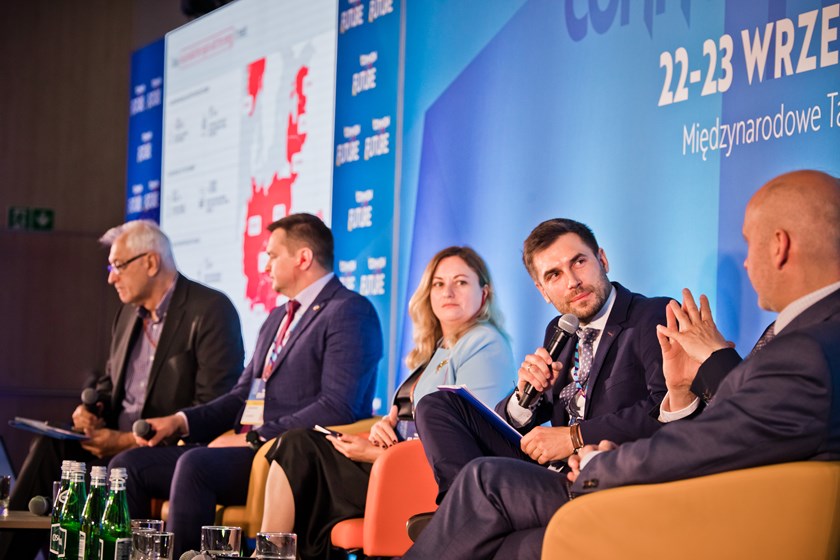
The third edition of the Common Future Congress on Cooperation with Ukraine in Poznań showed that the shared future of Poland and Ukraine is based on real actions – from strategic debates, through investments and projects, to signed agreements. The event confirmed that economic, energy and financial cooperation provides a solid foundation for the further reconstruction of Ukraine and the development of the region.



